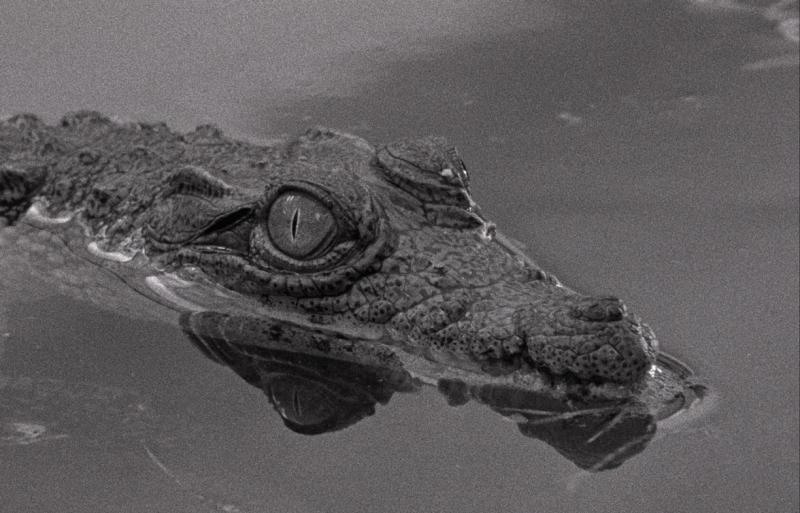DVD: Tabu | reviews, news & interviews
DVD: Tabu
DVD: Tabu
Formally daring film from Miguel Gomes has an old-fashioned beating heart

Contemporary homages to the silent age are tuppence are dozen, but none are quite as eccentric as Miguel Gomes’s Tabu. One of last year’s oddball gems, it joins The Artist and Hugo in sending a love letter to cinema’s formative geniuses and yet sets its swooningly romantic silent section in a Portuguese colony of Africa in the turbulent early 1960s. Its starcrossed protagonists have a scene of frank lovemaking, and one of the silent stars is a baby crocodile.
Tabu’s two segments – which take the names of Paradise Lost and Paradise – are the story’s effect and cause. The first is set in wintry present-day Lisbon, where a lonely do-gooding Catholic spinster Pilar (Teresa Madruga) offers neighbourly support to chaotic, dysfunctional old bat Aurora (Laura Soveral), who delusory behaviour – and estrangement from her daughter – is explained the illicit love affair we see played out in the lush sun-baked second half, set in Africa half a century earlier. Here Aurora (now played by Laura Soveral) blossoms anew like a sad-eyed siren of early cinema). The chasm between past and present is underpinned by Gomes’s audacious decision to bleed the colonial scenes of speech, other than the narrative drone of Aurora’s now ancient lover Ventura (Espírito Santo in old age, Carloto Cotta in youth). It's the boldest formal trope of a director with a poet's visual eye to match.
Rather than submit his quirky masterpiece to vulgar exegesis by interview or, even worse, director’s commentary, Gomes includes two short films by way of extras. They act as uncompromising companion pieces to the Tabu’s opening sequence, which turns out to be an excerpt from a fictional film watched by Pilar in her fruitless quest for romance. In it a lone 19th-century explorer whose wife has died feeds himself sacrificially to a hungry crococile, a reptile which thus comes to symbolise love later in the film. For further notes on Tabu look no further than Graham Fuller’s scholarly unpacking of its cinematic antecedents, as reviewed on theartsdesk upon its theatrical release.
rating
Explore topics
Share this article
Subscribe to theartsdesk.com
Thank you for continuing to read our work on theartsdesk.com. For unlimited access to every article in its entirety, including our archive of more than 15,000 pieces, we're asking for £5 per month or £40 per year. We feel it's a very good deal, and hope you do too.
To take a subscription now simply click here.
And if you're looking for that extra gift for a friend or family member, why not treat them to a theartsdesk.com gift subscription?
more Film
 Bermondsey Tales: Fall of the Roman Empire review - dirty deeds done dirt cheap
Michael Head's gangland drama is a bit of a dog's breakfast
Bermondsey Tales: Fall of the Roman Empire review - dirty deeds done dirt cheap
Michael Head's gangland drama is a bit of a dog's breakfast
 Two Tickets to Greece review - the highs and lows of a holiday from hell
Laure Calamy, Olivia Côte and Kristin Scott Thomas star in a silly French comedy
Two Tickets to Greece review - the highs and lows of a holiday from hell
Laure Calamy, Olivia Côte and Kristin Scott Thomas star in a silly French comedy
 Hoard review - not any old rubbish
A star is born amid the muck and squalor of Luna Carmoon's ambitious directorial debut
Hoard review - not any old rubbish
A star is born amid the muck and squalor of Luna Carmoon's ambitious directorial debut
 Blu-ray: Chocolat
Claire Denis' African debut is a nostalgic yet unsparing look at colonial life
Blu-ray: Chocolat
Claire Denis' African debut is a nostalgic yet unsparing look at colonial life
 DVD/Blu-ray: The Holdovers
Bittersweet, beautifully observed seasonal comedy - not just for Christmas
DVD/Blu-ray: The Holdovers
Bittersweet, beautifully observed seasonal comedy - not just for Christmas
 Our Mothers review - revisiting the horrors of Guatemala's civil war
Hard-hitting first feature from director Cesar Diaz
Our Mothers review - revisiting the horrors of Guatemala's civil war
Hard-hitting first feature from director Cesar Diaz
 Kingdom of the Planet of the Apes review - a post-human paradise
A richly suggestive new era for the franchise reconnects with its 1968 start
Kingdom of the Planet of the Apes review - a post-human paradise
A richly suggestive new era for the franchise reconnects with its 1968 start
 La Chimera review - magical realism with a touch of Fellini
Josh O’Connor excels as an archaeologist turned graverobber in the Italian countryside
La Chimera review - magical realism with a touch of Fellini
Josh O’Connor excels as an archaeologist turned graverobber in the Italian countryside
 Made in England: The Films of Powell and Pressburger review - the Archers up close
Adoring tribute by Martin Scorsese to British filmmaking legends
Made in England: The Films of Powell and Pressburger review - the Archers up close
Adoring tribute by Martin Scorsese to British filmmaking legends
 Love Lies Bleeding review - a pumped-up neo-noir
There's darkness on the edge of town in Rose Glass's sweaty, violent New Queer gem
Love Lies Bleeding review - a pumped-up neo-noir
There's darkness on the edge of town in Rose Glass's sweaty, violent New Queer gem
 Nezouh review - seeking magic in a war
A movie that looks on the dreamier side of Syrian strife
Nezouh review - seeking magic in a war
A movie that looks on the dreamier side of Syrian strife
 Blu-ray: The Dreamers
Bertolucci revisits May '68 via intoxicated, transgressive sex, lit up by the debuting Eva Green
Blu-ray: The Dreamers
Bertolucci revisits May '68 via intoxicated, transgressive sex, lit up by the debuting Eva Green

Add comment